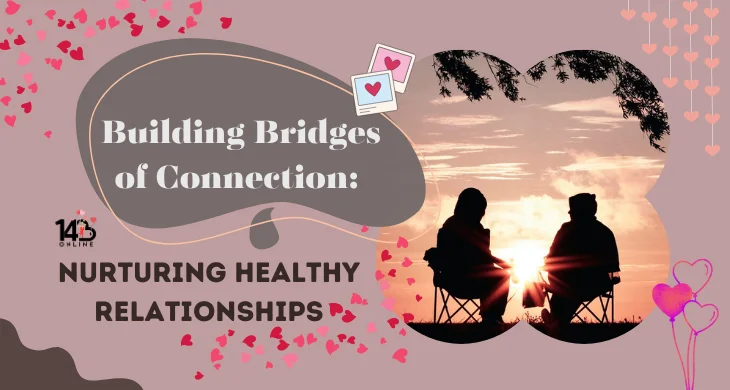Introduction
In a world where meaningful connections matter, “Building Bridges of Connection: Nurturing Healthy Relationships” delves into the essence of fostering strong interpersonal bonds. Explore the art of cultivating trust, effective communication, empathy, and mutual understanding, paving the way for enriching and enduring relationships.
The Importance of Connection
The importance of connection lies at the heart of the human experience. Healthy relationships are not just pleasant; they’re essential for our well-being & emotional fulfillment. These bonds provide us with a sense of belonging, acceptance, & understanding. Meaningful connections with friends, family, partners, & even within communities contribute to reduced stress, increased happiness, & enhanced mental health. Beyond personal benefits, strong relationships facilitate effective communication, teamwork, & empathy. They allow us to share our joys & sorrows, creating a support system that helps us navigate life’s challenges. Recognizing & nurturing these connections is integral to living a more enriched & balanced life.
Effective Communication
Effective communication forms the bedrock of healthy relationships. Active listening, where we truly hear and understand others, builds rapport and mutual respect. Open dialogue encourages the free exchange of thoughts and feelings, fostering trust and transparency. Clear expression ensures that our intentions and emotions are conveyed accurately. This synergy of active listening, open dialogue, and clear expression enhances mutual understanding and deepens connections. It nurtures an environment where individuals feel valued and heard, strengthening emotional bonds. Through these practices, communication becomes a bridge that unites hearts and minds, enabling authentic connections to flourish within relationships.
Trust Building
Trust is the cornerstone of any meaningful relationship. It’s the glue that binds individuals together, creating a foundation of security and intimacy. Building trust involves consistent actions that align with one’s words, demonstrating reliability and dependability. Honesty, even in difficult conversations, is essential for fostering trust. When promises are kept and intentions are transparent, trust flourishes. This sense of security encourages vulnerability and openness, enabling individuals to share their true selves without fear. Trust allows relationships to weather challenges, as a strong foundation of trust ensures partners stand together, knowing they can rely on each other’s unwavering support.
Empathy and Understanding
Empathy and understanding are bridges that connect hearts and minds in relationships. Cultivating empathy involves stepping into another’s perspective, acknowledging their feelings, and validating their experiences. By truly comprehending their emotions, we foster compassion and forge deeper bonds. Understanding each other’s joys and struggles builds intimacy and trust. Empathy dismantles barriers and nurtures an environment where vulnerability is embraced. This practice creates a safe space for open communication and mutual support. By valuing another’s feelings, we weave a tapestry of connection, where empathy becomes the cornerstone of rich, meaningful relationships that flourish with shared experiences and genuine care.
Conflict Resolution
Conflict is a natural part of relationships, but how we navigate it determines the course of connection. Constructive conflict resolution involves open, respectful communication. Listening and acknowledging differing perspectives lays the groundwork for compromise. By focusing on finding solutions rather than blaming, relationships can grow stronger. Conflict can unearth deeper understanding, leading to personal and relational growth. It’s a chance to learn about each other’s needs and boundaries. Handling conflicts with empathy and respect builds trust, while compromise fosters cooperation. Embracing conflict as an opportunity for growth, relationships evolve into resilient partnerships built on effective communication and mutual understanding.
Quality Time Together
Amidst life’s busyness, dedicating quality time to loved ones is a cornerstone of healthy relationships. This means being fully present, with distractions set aside, to engage in meaningful interactions. Quality time fosters deeper connections by allowing for genuine conversations, shared experiences, and creating lasting memories. It communicates the importance of the relationship and reaffirms emotional bonds. Whether through shared activities or simply spending moments together, this intentional time cultivates intimacy and strengthens the foundation of connection. It’s a reminder that, in the midst of life’s chaos, the moments we invest in one another are what truly enrich our lives.
Boundaries and Respect
Setting healthy boundaries and respecting individuality is paramount in fostering thriving relationships. Boundaries define personal limits, ensuring each person’s emotional, physical, and mental well-being is respected. They create a safe space where individuals can express needs and expectations openly. Respect for boundaries fosters understanding and trust, demonstrating care for each other’s comfort zones. Acknowledging and valuing individuality within relationships nurtures growth and autonomy. It’s a recognition that while connections are cherished, everyone retains their unique identity. Striking this balance between togetherness and personal space enriches relationships, allowing individuals to flourish both as partners and individuals.
FAQ’s
Q1: Why are healthy relationships important?
A1: Healthy relationships contribute to emotional well-being, provide support during challenges, and enhance overall quality of life.
Q2: How can effective communication improve relationships?
A2: Effective communication fosters understanding, prevents misunderstandings, and encourages open dialogue, leading to stronger bonds.
Q3: What role does trust play in relationships?
A3: Trust is the foundation of relationships. It creates a sense of security, fosters vulnerability, and promotes deeper connections.
Q4: How does empathy enhance relationships?
A4: Empathy promotes understanding by allowing us to connect with others on an emotional level, validating their feelings and experiences.
Q5: How can conflicts be resolved constructively?
A5: Conflict resolution involves respectful communication, active listening, and a focus on finding solutions that accommodate both parties.
Q6: Why is quality time together important?
A6: Spending undistracted, meaningful time with loved ones reinforces emotional bonds, creates shared memories, and strengthens connections.
conclusion
In conclusion, “Building Bridges of Connection: Nurturing Healthy Relationships” is a roadmap to cultivating profound and lasting connections. By embracing effective communication, trust, empathy, and respect, we create a foundation that strengthens relationships. This journey reminds us that relationships require continuous effort, empathy, and understanding. As we embark on this path, let us remember that meaningful bonds are the cornerstone of a fulfilling life. By fostering connections that celebrate individuality & shared experiences, we build bridges that transcend time & distance, enriching our lives & the lives of those we hold dear.

